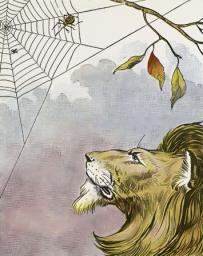The Lion and the Spider
It was a sunny day in the grassland. The lion had slept well. It was fierce when it hunted. But today it was not hungry yet. It would hunt for food later in the day. Right now, all it wanted to do was relax. It stretched out and watched the grass.
Then it noticed a spider. The spider was climbing on a plant. Then the spider jumped to the next plant and left a string between them. It was making a web. The lion watched for a while. “How clever you are,” it said to the spider. “How did you learn to do that?”
The spider said, “My mother showed me how to do this. I learned from her. And I have taught my children how to make webs.”
The lion watched a while longer. Then it asked the spider, “But why do you do that when you could just grab your food, the way I do?”
“I am just a small animal. I cannot run fast. So I do not eat insects that run. I cannot fly. I eat flies. So with my web I can catch them.”
The lion said, “Could you make me a web that could catch an animal for me to eat? Then I would not have to run after them either.”
The spider thought about that. At first she thought the lion was joking. But he was not.
“I can’t do that,” she said. “My web can catch a fly. But it could not catch a big animal. And you could not live by eating flies.”
Just then a fly flew into the spider’s web. She went to get it. She wrapped it up for her children. Then she went back to spinning more of the web.
The lion was very selfish. It was jealous of the spider. It did not have to work hard for its food. And it would not help him get his food. So it slapped at the spider web and broke it. But the spider jumped onto the lion’s back. And it bit the lion.
“Now you will remember me,” said the spider as she hopped off and into the grass. “Think before you are mean to another animal. We are all special. And some of us may be small but very smart.”
The lion tried to scratch its back but could not reach the spider bite. It itched for days. The lion remembered the smart spider for a long time.
